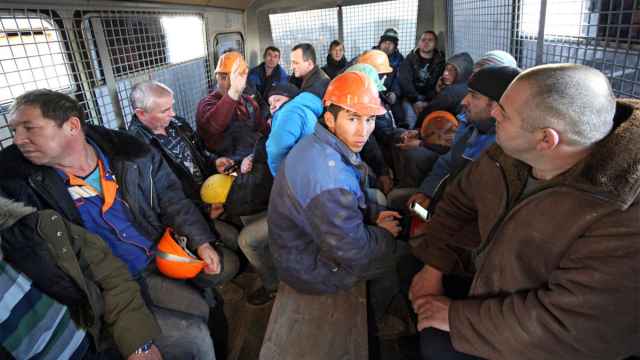Посиделки: get-togethers
Ho ho ho! I’m in my countdown-to-the-holidays mode, which admittedly would be a bit easier to maintain if Moscow weather weren’t giving me the muddy background of October or March while I’m craving piles of fluffy December snow. Be that as it may, since you might be receiving invitations to коктейль (which is a cocktail party — honest) or гала-вечер (gala), I thought it might be helpful to have a little party primer so you know where you’re going, what to bring, and how to dress.
If in Russian праздник is any kind of holiday, celebration, festivity or feast, in English we have the all-purpose word party, which refers to anything from having your neighbor in for a glass of wine to renting out the Petrovsky Palace for 200 of your closest personal friends. Since Russian doesn’t have one word-fits-all for this, it has taken the English word, dropping the “r” in the Russian version of British English: пати. Really. I don’t have the imagination to make this up.
What I also could not make up is that пати is feminine gender, which may be because it is really just вечеринка (the real word for party in Russian, feminine gender). But until I find out, you can say: Я устроила фантастическую пати у себя! (I had a fantastic party at my place!)
Back to real Russian… where the words for parties are mostly derived from when they are held, who is invited, or what you do at them. First up is вечеринка, from вечер (evening). Here is an old-fashioned one: Мы устраивали вечеринки ― танцы под пластинки, разбавленные алкоголем… (We used to have parties where we’d dance to records, all loosened up by booze…) And here’s a new-fashioned one: И разве это не украшение лыжной поездки ― два-три дня в Монте-Карло и одна сплошная вечеринка, полная гламура? (Wouldn’t the perfect way to top off a ski trip be taking two or three days in Monte Carlo at one non-stop, glamorous party?)
Next up is вечер, вечеринка’s more staid cousin. These are often public events, along the lines of поэтический вечер (an evening of poetry), but they can also be very private events, along the lines of романтический вечер (a romantic evening). Dress accordingly.
Very staid indeed would be приём (reception), which is derived from the verb принимать (to receive) and is in very polite, correct Russian приём гостей (a reception of guests). I assume this is from the days when you’d be receiving guests for certain hours on certain days, but, hey, I’m a middle class kid from Schenectady, New York — so what do I know? Она устроила большой приём гостей, стол ломился от изысканного угощения (She held a big reception with tables groaning under platters of delicacies.) If you get invited to приём, chances are it is going to be rather formal. Polish your shoes! In Russia dirty shoes are a very grave sin.
In the old days, the biggest shock Russians experienced in the U.S. was the cocktail party, an event where, in the horrified words of a beloved friend: Пьют стоя без закусок! (They drink standing up without anything to eat!) Lately Russians have not only stopped howling with horror over them but have started having them. They call them either приём-коктейль (cocktail reception) or simply коктейль (cocktails). Magazines tout their benefits over more formal parties for the modern host or hostess: К проведению коктейля нужно гораздо меньше готовиться, времени само мероприятие занимает меньше и позволяет в сравнительно небольшом доме принять много народа (The preparation for a cocktail party is much less, the party itself takes less time and it permits you to receive a lot of guests in a relatively small home.) Also true of Moscow-sized apartments. Bring a host/hostess gift and wear something slightly nicer than usual work clothes.
Much less formal, and much more traditional, is the lovely посиделки (always plural), from посидеть (to sit for a while). This is the way Russians traditionally welcome guests and celebrate: sitting down, at a table, with food and drink. This is so important that you plan your house around it: В расчёте на частые дружеские посиделки мы сделали не просто кухню, а настоящую большую столовую, где всем просторно и в то же время уютно (We were considering that we’d often have friends over for get-togethers, so we didn’t make just a kitchen, but we made a huge, real dining room where everyone would have plenty of room but it would be cozy, too.) Bring sweets or something to drink; dress code depends on your friends.
In the old days there were also traditional девичники and мальчишники (hen parties and stag parties) before weddings that now seem to be organized based on American B movies. But you can use these terms for any single-sex gathering. Мой муж сегодня поехал на мальчишник — по четвергам ребята идут в баню (Today my husband is having a boy’s night out — every Thursday the guys go to the bathhouse.) Wear clean underwear.
If you are expecting to drink a lot, you use the party word derived from the verb for “to have a good time” — гулять — to get гулянка, or the word derived from the verb “to drink a great deal” — пьянствовать — to get пьянка. Or better yet, combine the two: пьянка-гулянка (a blow-out, bash). Вместе с мастерской Саша унаследовала чудесную богемную жизнь, с пьянками-гулянками, интересными людьми из всех слоёв общества (In addition to inheriting the studio, Sasha inherited a bohemian life-style, with drinking parties and fascinating people from every walk of life.) Wear something washable. Bring booze.
You might get invited to an interesting-sounding party: сабантуй. If you are in the Volga region in the spring, you’ve just been invited to a big celebration after the ploughing and planting among Tatars, Bashkirs, and other national groups. If you are in Moscow among Russians, chances are it means a big party with lots to eat and drink. Перед праздниками в редакции всегда устраивался сабантуй (Before the holidays our editorial group always let it rip at a big party.) Big food, drink, and taxi money.
And finally, there is a get-together that is, for reasons I cannot completely explain, one of my favorite words in Russian: междусобойчик. This is any get-together of insiders or close friends — a party without any outsiders. Всегда были междусобойчики в домашней обстановке: чай и пироги или выпивка и ужин (We always had our closest friends over to our place, and we’d sit around and have tea and pastries or dinner and something to drink.) Don’t you wish you were an insider at their междусобойчик?
But wherever you are invited this holiday season, may your days be merry and bright!
С праздниками!






